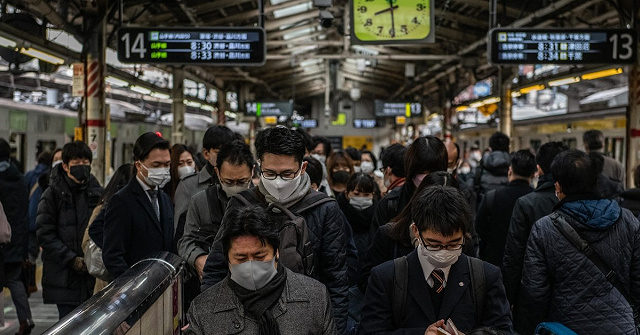Monthly suicide rates in Japan increased 16 percent from July to October 2020 compared to the same period last year, Japanese researchers found. The three-month interval coincided with the second wave of Chinese coronavirus outbreaks in Japan, Reuters reported on Sunday.
Published by researchers at the Tokyo Metropolitan Institute of Gerontology and the University of Hong Kong in the scientific journal Nature Human Behavior on January 15, the study found a greater increase in suicide rates “among women (37 percent) and children and adolescents (49 percent)”.
Friday’s findings contrast sharply with suicide data from the first wave of coronaviruses in Japan – February to June 2020 – when the country saw a 14 percent decline in the number of suicides across the country. Some observers attributed the drop to increased government subsidies during blocking periods, as well as reduced working hours and school closures. Japanese researchers have suggested that conditions may have reduced daily stress for the country’s traditionally overworked citizens.
Scientists based the January 15 suicide study on data from the Japanese Ministry of Health from November 2016 to October 2020.
“Unlike normal economic circumstances, this pandemic disproportionately affects the psychological health of children, adolescents and women (especially housewives),” wrote the study’s authors.
The 37% increase in female suicides was “about five times the increase among men – since the prolonged pandemic has damaged the industries where women predominate, increasing the burden on working mothers, while domestic violence has increased”, observed the researchers.
On January 7, Japanese Prime Minister Suga Yoshihide declared a limited state of emergency for Tokyo and three of its neighboring prefectures, after health officials recorded an increase in the number of new daily cases of coronavirus across the capital region. Suga expanded the state of emergency to seven additional prefectures, including Osaka and Kyoto, on January 13. Blocking restrictions in the national capital are scheduled to last until at least February 7 and will shut down or restrict service at Greater Tokyo’s 150,000 restaurants and bars.
Japan’s minister of administrative and regulatory reform, Kono Taro, told Reuters on January 14 that the Japanese federal government “cannot kill the economy” in its efforts to curb the latest resurgence of the coronavirus in Japan, as this may have a destructive impact on the country’s collective mental health.
“People care about COVID-19 [Chinese coronavirus]. But many people also committed suicide because they lost their jobs, lost their income and saw no hope, ”Kono told the news agency.
“We need to find the balance between managing COVID-19 [Chinese coronavirus] and management of the economy, ”he added.
